(完整版)情态动词讲解练习题集和答案解析
- 格式:pdf
- 大小:234.15 KB
- 文档页数:9
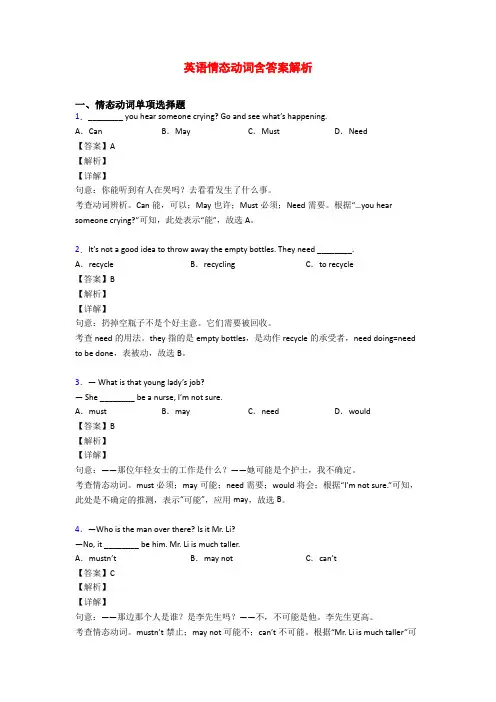
英语情态动词含答案解析一、情态动词单项选择题1.________ you hear someone crying? Go and see what’s happening.A.Can B.May C.Must D.Need【答案】A【解析】【详解】句意:你能听到有人在哭吗?去看看发生了什么事。
考查动词辨析。
Can能,可以;May也许;Must必须;Need需要。
根据“…you hear someone crying?”可知,此处表示“能”,故选A。
2.It’s not a good idea to throw away the empty bottles. They need ________.A.recycle B.recycling C.to recycle【答案】B【解析】【详解】句意:扔掉空瓶子不是个好主意。
它们需要被回收。
考查need的用法。
they指的是empty bottles,是动作recycle的承受者,need doing=need to be done,表被动,故选B。
3.—What is that young lady’s job?— Sh e ________ be a nurse, I’m not sure.A.must B.may C.need D.would【答案】B【解析】【详解】句意:——那位年轻女士的工作是什么?——她可能是个护士,我不确定。
考查情态动词。
must必须;may可能;need需要;would将会;根据“I’m not sure.”可知,此处是不确定的推测,表示“可能”,应用may,故选B。
4.—Who is the man over there? Is it Mr. Li?—No, it ________ be him. Mr. Li is much taller.A.mustn’t B.may not C.can’t【答案】C【解析】【详解】句意:——那边那个人是谁?是李先生吗?——不,不可能是他。
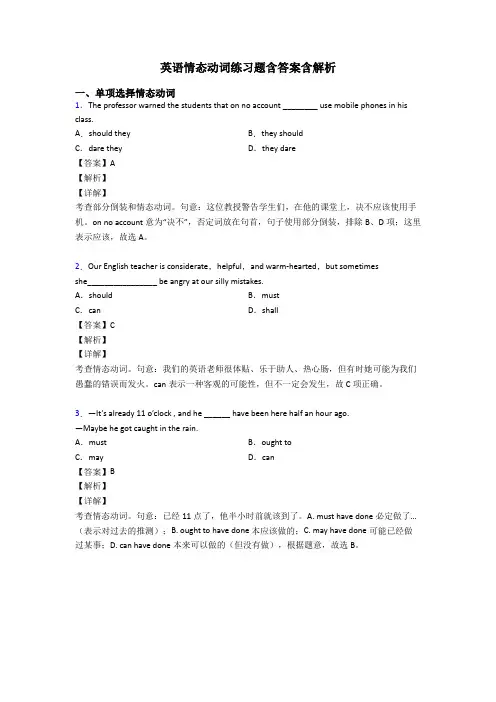
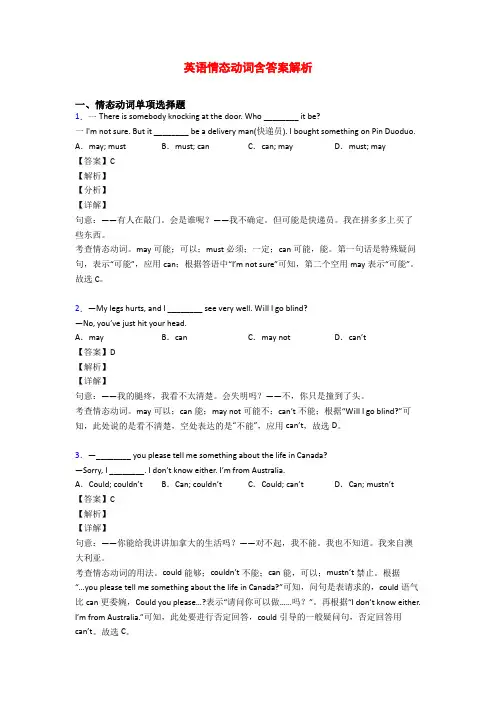
英语情态动词含答案解析一、情态动词单项选择题1.一There is somebody knocking at the door. Who ________ it be?一I'm not sure. But it ________ be a delivery man(快递员). I bought something on Pin Duoduo. A.may; must B.must; can C.can; may D.must; may【答案】C【解析】【分析】【详解】句意:——有人在敲门。
会是谁呢?——我不确定。
但可能是快递员。
我在拼多多上买了些东西。
考查情态动词。
may可能;可以;must必须;一定;can可能,能。
第一句话是特殊疑问句,表示“可能”,应用can;根据答语中“I’m not sure”可知,第二个空用may表示“可能”。
故选C。
2.—My legs hurts, and I ________ see very well. Will I go blind?—No, you’ve just hit your head.A.may B.can C.may not D.can’t【答案】D【解析】【详解】句意:——我的腿疼,我看不太清楚。
会失明吗?——不,你只是撞到了头。
考查情态动词。
may可以;can能;may not可能不;can’t不能;根据“Will I go blind?”可知,此处说的是看不清楚,空处表达的是“不能”,应用can’t,故选D。
3.—________ you please tell me something about the life in Canada?—Sorry, I ________. I don’t know either. I’m from Australia.A.Could; couldn’t B.Can; couldn’t C.Could; can’t D.Can; mustn’t【答案】C【解析】【详解】句意:——你能给我讲讲加拿大的生活吗?——对不起,我不能。

英语情态动词含答案解析一、情态动词单项选择题1.Tom, you ________ play with the knife. You ________ hurt yourself.A.won’t; can’t B.mustn’t; may C.shouldn’t; must D.can’t; should【答案】B【解析】【详解】句意:汤姆,你不准玩刀,会伤到自己的。
考查情态动词。
won’t将不会;can’t不能;mustn’t禁止;may可能,表推测;shouldn’t不应该;must必须;should应该;根据“play with the knife.”可知,玩刀是不可以的行为,应该是禁止的,因此第一空使用mustn’t,表示“禁止”符合语境;根据“hurt yourself.”可知,玩刀伤了自己是一种可能行为,表推测,所以第二空使用may,表示“可能”符合语境。
故选B。
2.We teenagers ________ have dreams. With dreams and hard work, anything amazing________ be created.A.may; can B.might; should C.should; can D.must; has to【答案】C【解析】【分析】【详解】句意:我们青少年应该有梦想。
有梦想和努力,任何惊人的事都能被创造。
考查情态动词。
may可能;can能够;should应该;might可能;has to不得不;must必须。
第一个空表示“应该”,用should;第二个空表示能力,用can。
故选C。
3.—Listen! I think it ________be Mr. White singing in the office.—No. It ________ be him. He left for London just now.A.must; mustn’t B.may; mustn’t C.must; can’t D.can; can【答案】C【解析】【详解】句意:——听,我认为那一定是怀特先生在办公室唱歌。
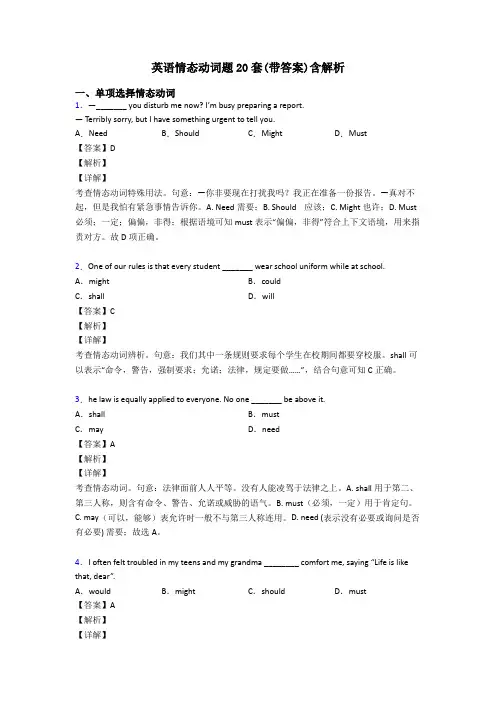
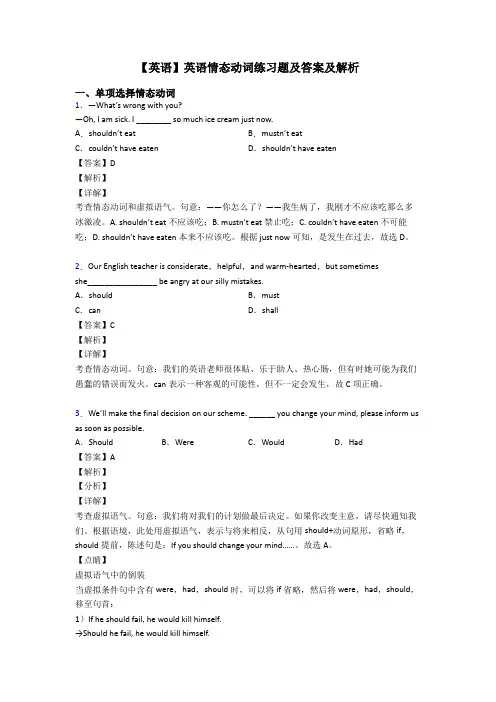
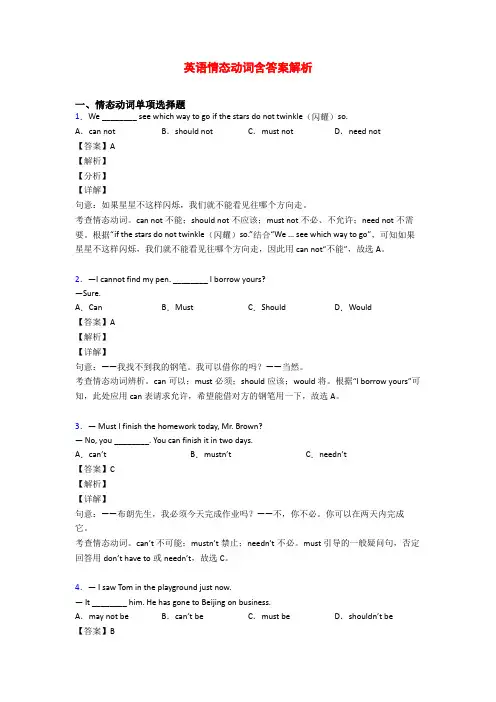
英语情态动词含答案解析一、情态动词单项选择题1.We ________ see which way to go if the stars do not twinkle(闪耀)so.A.can not B.should not C.must not D.need not【答案】A【解析】【分析】【详解】句意:如果星星不这样闪烁,我们就不能看见往哪个方向走。
考查情态动词。
can not不能;should not不应该;must not不必、不允许;need not不需要。
根据“if the stars do not twinkle(闪耀)so.”结合“We … see which way to go”,可知如果星星不这样闪烁,我们就不能看见往哪个方向走,因此用can not“不能”,故选A。
2.—I cannot find my pen. ________ I borrow yours?—Sure.A.Can B.Must C.Should D.Would【答案】A【解析】【详解】句意:——我找不到我的钢笔。
我可以借你的吗?——当然。
考查情态动词辨析。
can可以;must必须;should应该;would将。
根据“I borrow yours”可知,此处应用can表请求允许,希望能借对方的钢笔用一下,故选A。
3.— Must I finish the homework today, Mr. Brown?— No, you ________. You can finish it in two days.A.can’t B.mustn’t C.needn’t【答案】C【解析】【详解】句意:——布朗先生,我必须今天完成作业吗?——不,你不必。
你可以在两天内完成它。
考查情态动词。
can’t不可能;mustn’t禁止;needn’t不必。
must引导的一般疑问句,否定回答用don’t have to或needn’t,故选C。
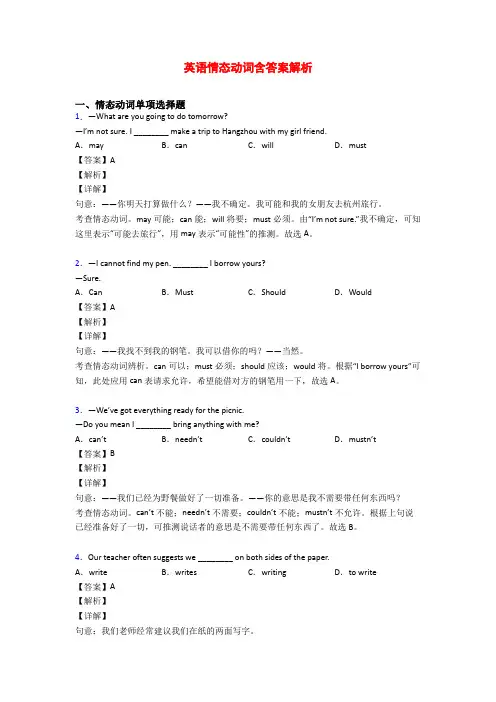
英语情态动词含答案解析一、情态动词单项选择题1.—What are you going to do tomorrow?—I’m not sure. I ________ make a trip to Hangzhou with my girl friend.A.may B.can C.will D.must【答案】A【解析】【详解】句意:——你明天打算做什么?——我不确定。
我可能和我的女朋友去杭州旅行。
考查情态动词。
may可能;can能;will将要;must必须。
由“I’m not sure.”我不确定,可知这里表示“可能去旅行”,用may表示“可能性”的推测。
故选A。
2.—I cannot find my pen. ________ I borrow yours?—Sure.A.Can B.Must C.Should D.Would【答案】A【解析】【详解】句意:——我找不到我的钢笔。
我可以借你的吗?——当然。
考查情态动词辨析。
can可以;must必须;should应该;would将。
根据“I borrow yours”可知,此处应用can表请求允许,希望能借对方的钢笔用一下,故选A。
3.—We’ve got everything ready for the picnic.—Do you mean I ________ bring anything with me?A.can’t B.needn’t C.couldn’t D.mustn’t【答案】B【解析】【详解】句意:——我们已经为野餐做好了一切准备。
——你的意思是我不需要带任何东西吗?考查情态动词。
can’t不能;needn’t不需要;couldn’t不能;mustn’t不允许。
根据上句说已经准备好了一切,可推测说话者的意思是不需要带任何东西了。
故选B。
4.Our teacher often suggests we ________ on both sides of the paper.A.write B.writes C.writing D.to write【答案】A【解析】【详解】句意:我们老师经常建议我们在纸的两面写字。
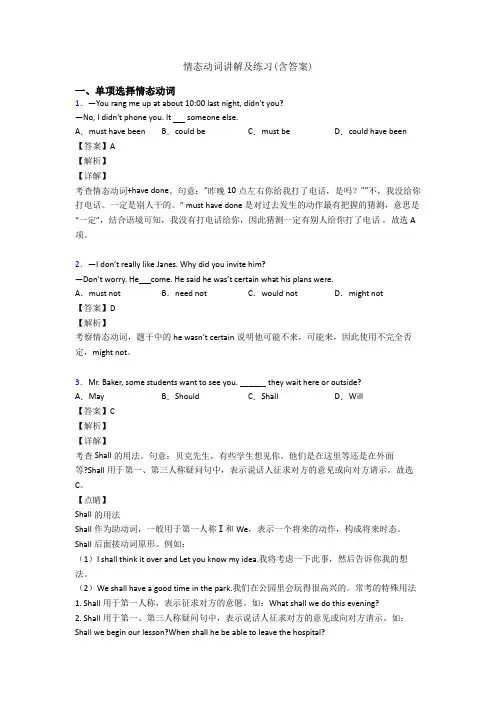
情态动词讲解及练习(含答案)一、单项选择情态动词1.—You rang me up at about 10:00 last night, didn't you?—No, I didn't phone you. It someone else.A.must have been B.could be C.must be D.could have been 【答案】A【解析】【详解】考查情态动词+have done。
句意:“昨晚10点左右你给我打了电话,是吗?”“不,我没给你打电话。
一定是别人干的。
” must have done 是对过去发生的动作最有把握的猜测,意思是“一定”,结合语境可知,我没有打电话给你,因此猜测一定有别人给你打了电话。
故选A 项。
2.—I don’t really like Janes. Why did you invite him?—Don’t worry. He come. He said he was’t certain what his plans were.A.must not B.need not C.would not D.might not【答案】D【解析】考察情态动词,题干中的he wasn’t certain说明他可能不来,可能来,因此使用不完全否定,might not。
3.Mr. Baker, some students want to see you. ______ they wait here or outside?A.May B.Should C.Shall D.Will【答案】C【解析】【详解】考查Shall的用法。
句意:贝克先生,有些学生想见你。
他们是在这里等还是在外面等?Shall用于第一、第三人称疑问句中,表示说话人征求对方的意见或向对方请示。
故选C。
【点睛】Shall的用法Shall作为助动词,一般用于第一人称Ⅰ和We,表示一个将来的动作,构成将来时态。
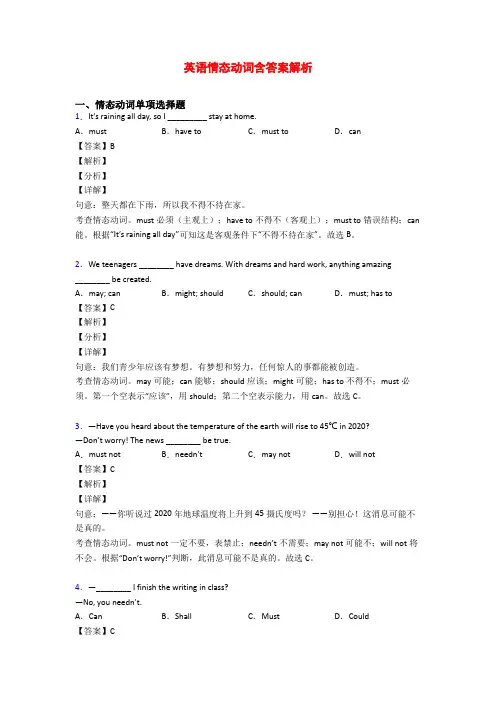
英语情态动词含答案解析一、情态动词单项选择题1.It’s raining all day, so I _________ stay at home.A.must B.have to C.must to D.can【答案】B【解析】【分析】【详解】句意:整天都在下雨,所以我不得不待在家。
考查情态动词。
must必须(主观上);have to不得不(客观上);must to错误结构;can 能。
根据“It’s raining all day”可知这是客观条件下“不得不待在家”。
故选B。
2.We teenagers ________ have dreams. With dreams and hard work, anything amazing________ be created.A.may; can B.might; should C.should; can D.must; has to【答案】C【解析】【分析】【详解】句意:我们青少年应该有梦想。
有梦想和努力,任何惊人的事都能被创造。
考查情态动词。
may可能;can能够;should应该;might可能;has to不得不;must必须。
第一个空表示“应该”,用should;第二个空表示能力,用can。
故选C。
3.—Have you heard about the temperature of the earth will rise to 45℃ in 2020?—Don’t worry! The news ________ be true.A.must not B.needn’t C.may not D.will not【答案】C【解析】【详解】句意:——你听说过2020年地球温度将上升到45摄氏度吗?——别担心!这消息可能不是真的。
考查情态动词。
must not一定不要,表禁止;needn’t不需要;may not可能不;will not将不会。
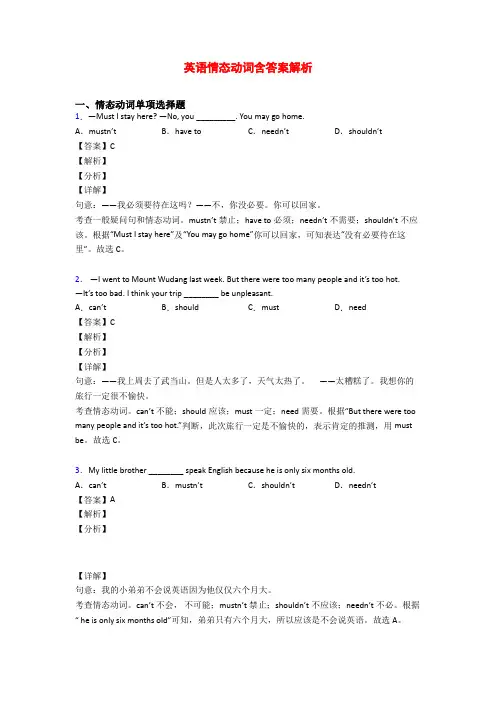
英语情态动词含答案解析一、情态动词单项选择题1.—Must I stay here? —No, you _________. You may go home.A.mustn’t B.have to C.needn’t D.shouldn’t【答案】C【解析】【分析】【详解】句意:——我必须要待在这吗?——不,你没必要。
你可以回家。
考查一般疑问句和情态动词。
mustn’t禁止;have to必须;needn’t不需要;shouldn’t不应该。
根据“Must I stay here”及“You may go home”你可以回家,可知表达“没有必要待在这里”。
故选C。
2.—I went to Mount Wudang last week. But there were too many people and it’s too hot.—It’s too bad. I think your trip ________ be unpleasant.A.can’t B.should C.must D.need【答案】C【解析】【分析】【详解】句意:——我上周去了武当山。
但是人太多了,天气太热了。
——太糟糕了。
我想你的旅行一定很不愉快。
考查情态动词。
can’t不能;should应该;must一定;need需要。
根据“But there were too many people and it’s too hot.”判断,此次旅行一定是不愉快的,表示肯定的推测,用must be。
故选C。
3.My little brother ________ speak English because he is only six months old.A.can’t B.m ustn’t C.shouldn’t D.needn’t【答案】A【解析】【分析】【详解】句意:我的小弟弟不会说英语因为他仅仅六个月大。
考查情态动词。
英语情态动词含答案解析一、情态动词单项选择题1.It’s raining all day, so I _________ stay at home.A.must B.have to C.must to D.can【答案】B【解析】【分析】【详解】句意:整天都在下雨,所以我不得不待在家。
考查情态动词。
must必须(主观上);have to不得不(客观上);must to错误结构;can 能。
根据“It’s raining all day”可知这是客观条件下“不得不待在家”。
故选B。
2.We teenagers ________ have dreams. With dreams and hard work, anything amazing________ be created.A.may; can B.might; should C.should; can D.must; has to【答案】C【解析】【分析】【详解】句意:我们青少年应该有梦想。
有梦想和努力,任何惊人的事都能被创造。
考查情态动词。
may可能;can能够;should应该;might可能;has to不得不;must必须。
第一个空表示“应该”,用should;第二个空表示能力,用can。
故选C。
3.— I saw Tom in the playground just now.— It ________ him. He has gone to Beijing on business.A.may not be B.can’t be C.must be D.shouldn’t be【答案】B【解析】【详解】句意:——我刚才看见汤姆在操场上。
——不可能是他。
他去北京出差了。
考查情态动词。
may not be可能不是;can’t be不可能是;must be一定是;shouldn’t be不应该是。
根据后文“He has gone to Beijing on business”(他去北京出差了)可知,操场上的人不可能是汤姆。
英语情态动词含答案解析一、情态动词单项选择题1.If you don’t feel well, you may just ________.A.stopped reading B.stop reading C.stopped to read D.stop to read【答案】D【解析】【详解】句意:如果你感觉不舒服,你可以停下来去读会书。
考查stop的用法,观察句子,情态动词后应该接动词原形,排除选项A/C。
stop to dosth“停下来去做某事”,stop doing sth“停止正在做的事情”,根据“If you don’t feel well”,可知感觉不舒服应该是停下正在做的去阅读,故选D。
2.—________ I come in, sir?—Yes, please.A.Need B.May C.Might D.Must【答案】B【解析】【详解】句意:——先生,我可以进来吗?——可以,请进。
考查情态动词辨析。
Need需要;May可以;Might也许;Must必须。
根据答句“Yes, please.”可知,对方同意我进来,所以此处使用may表示请求允许。
故选B。
3.—May I swim here?—No, you ________. It’s dangerous here. I suggest ________ to the indoor swimming pool. A.can’t, go B.mustn’t, to go C.mustn’t, going【答案】C【解析】【分析】【详解】句意:——我可以在这里游泳吗?——不,你不能。
这里很危险。
我建议去室内游泳池。
考查情态动词和固定搭配。
can’t不可以;mustn’t禁止。
根据“It’s dangerous here.”可知,不可以在这里游泳,因此can’t/mustn’t都符合句意;再者根据固定搭配“suggest doing sth.”可知,going符合句意,结合选项,C符合句意。
英语情态动词含答案解析一、情态动词单项选择题1.— Yuan Longping, a famous Chinese scientist, is now doing research on sea rice.—If farmers ________ start planting rice in salty water, China’s food supply will surely rise. A.can B.can’t C.must D.mustn’t【答案】A【解析】【分析】【详解】句意:——中国著名科学家袁隆平正在研究海水稻。
——如果农民可以开始在咸水中种植水稻,中国的粮食供应肯定会增加。
考查情态动词。
can能,可以;can’t不能;must必须;mustn’t禁止。
根据“China’s food supply will surely rise”可知,可以在咸水中种植水稻的话,那么中国的粮食供应肯定会增加。
故选A。
2.By the time she was eight, Linda ________ read English and French.A.could B.must C.might D.may【答案】A【解析】【详解】句意:到八岁时,琳达已经会读英语和法语了。
考查情态动词。
could能,会;must一定;might可能;may也许。
根据“Linda... read English and French”可知,空格处应是指会读英语和法语,表示能力,用could。
故选A。
3.—Mom, ________ I play football this afternoon?— Sure, but you ________ finish your homework first.A.can; must B.may; could C.can; mustn’t【答案】A【解析】【详解】句意:——妈妈,我下午可以踢足球吗?——当然,但是你必须先完成作业。
情态动词专项练习及答案详解一、单项选择情态动词1.—Tony _______ what I did annoying though he didn’t say anything.—So you think you will have to make an apology?A.could find B.should have foundC.might find D.must have found【答案】D【解析】【详解】考查情态动词+have done。
句意:—Tony一定觉得我做的事很烦人,尽管他什么也没说。
—所以你认为你得道歉吗?。
由“what I did”可知,此处是对过去事情有把握的推测,must have done“一定是做某事了”。
故选D项。
【点睛】情态动词+ have done结构:1.“must + have + 过去分词”表示对过去发生的事情或状态进行推测,语气比较坚定,通常只用于肯定句.如:It must have rained last night,for the ground is wet.2.“can / could + have + 过去分词”表示对过去某种情况的怀疑或不确定.can和could一般用于否定句和疑问句,could的语气较can弱.如:He can't have finished the work so soon.3.“may / might + have + 过去分词”表示对已发生的动作或存在的状态进行不肯定的推测,might的语气比may弱一点.这种结构主要用于肯定句和否定句,疑问句改用can或could.如:They may not have known it beforehand.4.“need + have + 过去分词”表示过去做了不必做或不需要做的事情,或过去做某事纯属多余.如:I needn't have bought so much wine—only five people came.5.“should / ought to + have + 过去分词”表示过去本该做某事但没做,其否定式表示过去不该做某事但做了,这种句式含有不满或责备之意,ought to的语气比should强一些.如:You ought to / should have studied harder.你本应该更努力学习的.(但没有)He oughtn't to / shouldn't have done that.他本来就不该做那件事.(可是做了)6.“would + have +过去分词”表示对过去的某种情况进行猜测,或本来要做某事却因某种原因未做成,通常用来说明某一情况,但不像用should或ought to那样含有责备之意.如:I guess the poet would have been about twenty when she wrote her first poem.Another worker wouldn't have acted like that.分析句子可知,由“what I did”可知,此处是对过去事情有把握的推测,must have done“一定是做某事了”。
(could), may (might), must, have to, shall (should, will (would), dare (dared), need (needed), ought to 等。
情态动词无人称和数的变化;不能单独使用,必须与其后的动词原形构成谓语一、can, could1) 表示能力(体力、知识、技能) 。
Can you lift this heavy box? (体力)Mary can speak three languages.(知识) Can you skate?(技能)此时可用be able to 代替。
Can 只有一般现在时和一般过去式;而be able to 则有更多的时态。
I ' ll not be able to come this afternoon.当表示“经过努力才得以做成功某事”时应用be able to,不能用Can。
如:He was able to go to the party yesterday evening in spite of the heavy rain.2) 表示请求和允许。
---- C an I go now? Yes, you can. / No, you can 此时可'与t. may 互换。
在疑问句中还可用could, might 代替,不是过去式,只是语气更委婉,不能用于肯定句和答语中。
---- Could I come to see you tomorrow? Yes, you can. ( No, I ' m afraid not. )3) 表示客观可能性(客观原因形成的能力) 。
They ' vec hanged the timetable, so we can go by bus instead. This hall can hold 500 people at least. 4) 表示推测(惊讶、怀疑、不相信的态度) ,用于疑问句、否定句和感叹句中。
【英语】高中英语情态动词的技巧及练习题及练习题(含答案)含解析一、单项选择情态动词1.—You rang me up at about 10:00 last night, didn't you?—No, I didn't phone you. It someone else.A.must have been B.could be C.must be D.could have been 【答案】A【解析】【详解】考查情态动词+have done。
句意:“昨晚10点左右你给我打了电话,是吗?”“不,我没给你打电话。
一定是别人干的。
” must have done 是对过去发生的动作最有把握的猜测,意思是“一定”,结合语境可知,我没有打电话给你,因此猜测一定有别人给你打了电话。
故选A 项。
2.He is a bad-tempered fellow, but he ________ be quite charming when he wishes.A.shall B.shouldC.can D.must【答案】C【解析】【详解】考查情态动词辨析。
句意:他是个脾气不好的家伙,但当他希望自己有魅力的时候,他可以变得相当可爱。
此处表示“能、可以”,故C项正确。
3.—Did you attend the meeting for the experiment project yesterday?—Yes, but I don’t think I ____ because my director was there.A.need to have B.need to C.needed to D.need have【答案】D【解析】【分析】【详解】考查情态动词+have done。
句意:——你昨天参加实验项目的会议了吗?——是的,但我想我(本来)不需要,因为我的主管在那里。
Think/suppose等宾语从句中如果有否定词时,要把从句的否定词not前移,即“否定前移”。
情态动词主要用来表示说话人的看法、态度等,但不能单独作谓语,只能和其他动词原形构成谓语。
1. can (could)1) 表示能力,could主要指过去时间。
例如:① Two eyes can see more than one. 两只眼比一只眼看得清。
② Could the girl read before she went to school? 这女孩上学前能识字吗?因为can不能和其他助动词连用,所以表示将来式时用will be able to例:You will be able to skate after you have practiced it two or three times.注意:Can表示一贯的能力,be able to表示客观能力和通过努力可以达到的能力I can’t swim. But I am sure I will be able to swim through more practicing.The fire spread through the hotel, but everyone was able to get out2) 表示允许。
例如:① Can I have a look at your new pen? 我可以看一看你的新钢笔吗?② He asked whether he could take the book out of the reading—room. 他问他可不可以把书带出阅览室。
3) 表惊异、怀疑、不相信等态度。
主要用于否定句、疑问句或感叹句中。
例如:① Where can (could) they have gone to? 他们会去哪儿了呢?② How can you be so careless? 你怎么这么粗心?could 加完成式还用于肯定句时一般表过去可能完成而却未完成的动作。
You could have completed the task a little earlier.你本来能早点完成任务的。
(但事实上并没有提前完成任务)I could have passed my examination easily but I made too many stupid mistakes.我本可以轻易通过考试,但我犯了太多不该犯的错误。
如表具体做某一件事的能力时,则须用be able to .He was able to translate the article without a dictionary.他可以不用词典翻译那篇文章。
2.may (might)1) 表允许,might可以指过去时间,也可指现在时间,语气更委婉。
例如:① You may take whatever you like.你喜欢什么就拿什么。
② May (Might) I ask for a photo of your baby? 我可以要一张你宝宝的照片吗?2)在回答以may引起的问句时,多避免用这个词,而用其它方式,如Yes, please. / Certainly. / Please don’t. / You’d better not. / No, you mustn’t.等,以免显得太严峻或不客气。
3)may /might 推测性用法可能He may be right. He may not come today (可能不) He may /might come tomorrow.注意: (1)只用于肯定和否定句中,不用于疑问句中。
(2) might 比may可能性更小He might get a job. He may get a job.(3) may not 可能不can not不可能He may not come . He can’t come4)表建议(可和as well 连用)You may(might)as well stay where you are. 你还是原地待着好。
(may as well 有“还是……的好”的含义)5)表祝愿May you be happy!6). might表过去的“可能”和“允许”多用于间接引语。
She said that he might take her dictionary. 她说他可以拿她的词典去用。
除在间接引语中外,might一般不表示过去的“可能”与“许可”。
表过去的“可能”可用could,表过去的“许可”可用were (was) allowed to。
7)might表现在的“可能”,其可能性要比may小。
Electric irons could be dangerous; they might give you a severe shock.8)may (might) + have +done 表示对过去发生行为的推测,含有“想必”、“也许是”的意思。
It may have been true. 这事也许是真的。
He might not have settled the question. 他可能尚未解决那个问题。
3. must1)表示义务。
意为“必须”(主观意志)。
例如:We must do everything step by step .我们必须按部就班地做一切事情。
Why must you always bother me? 为什么你偏要打扰我呢。
2)must be + 表语的结构,通常表示猜测,含有“一定”之意。
(只用在肯定句中)He must be an honest boy.他一定是个诚实的男孩This must be your room.这一定是你的房间。
3)must 的否定式有两个:当回答由must引起的问题时,否定答复要用needn’t或don’t have to 表示“不必”、“无须”、“用不着”、“不一定”的意义。
当表示“不应该”、“不许可”、“禁止”时,就用must not。
Must I go tomorrow?明天我必须去吗?Yes, please. No , you needn’t.4)must +have +过去分词的结构,常用在肯定句中,表示对过去发生行为的推测,含有“一定”、“准是”的意思。
否定和疑问句用can。
She must have studied English before.她以前一定学过英语。
5) 区别:have to的含义与must是很接近的,只是have to 比较强调客观需要,must着重说明主观看法。
I must clean the room.(主观想法)I have to clean the room.(客观需要)另外,have to 能用于更多时态:We had to be there at ten .我们得在十点钟到那里。
We will have to reconsider the whole thing. have to 的否定式:don’t have to do 表示“不必做……”之意。
4.shall1) 表征询意见,用于第一、第三人称疑问句。
例如:① Shall I get you some tea? 我给你点茶好吗?② Shall the boy wait outside? 让那男孩在外面等吗?2)表说话人的意愿,有“命令、允诺、警告、决心”等意思,用于第二、第三人称陈述句。
例如:① You shall do as I say. 按我说的做。
(命令)② You shall have my answer tomorrow. 你明天可以得到我的答复。
(允诺)③ He shall be sorry for it one day, I tell you. 有一天他会后悔的,我告诉你。
(警告)④Nothing shall stop us from carrying out the plan. 什么也不能阻止我们执行这项计划。
(决心)5. should1)用于第一人称疑问句中询问对方的意愿,但语气较委婉温和,如:What should we do now? 我们现在该怎么办?2)表示应该、必须,常与must 换用。
例如:We should (must) master a foreign language at least.3)(表示不确定)万一。
例如:① If I should see him, I'll tell him. 万一我见到他,我就告诉他。
② If it should rain tomorrow, the sports meeting would be postponed. 万一明天下雨。
4)“should+be+表语”的结构,表示推测或惊奇。
例如:They should be back by now. 他们现在应该回来了吧。
I am sorry that she should be so careless. 我感到遗憾她竟会那样粗心。
5)“should+have+过去分词”的结构,表示过去该做而实际上尚未做的动作或行为;其否定则表示发生了不应该发生的行为。
其同义结构“ought to have +过去分词”,表示过去“早应该”、“本当”之意,语气较强。
例如:I should have thought of that. 这一点我是应当想到的。
(但没想到)They should not have left so soon.他们不应当走得这么早。
(但已走了)6) 在“It is natural (strange, natural, necessary, surprised, impossible, important ) that……”句型中,主语从句中的谓语动词要用should +动词原形”表示“理所当然”、“奇怪”、“必要”、“惊异”等的意思。
在lest(以免)、for fear (that) (以防)、in case(以备万一)等之后也要用should+动词原形;在advise, sugest, order, demand, request 等的从句中should+do”例如:It is necessary that he(should) be sent there at once.It is strange that he should say so. 他会说这样的话真是奇怪。
6.will和would的用法1)表示意志,决心或愿望。
例如: Surely we will support all the people in the world in their struggle for peace. He would not let me try it . 他不肯让我去试。